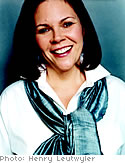
A Monumental Change
Five and a half years ago, she thought about food constantly. Today, she follows a balanced diet and is comfortable in her clothes.

On a rainy Saturday morning in 1998, Frances Kuffel walked into a roomful of strangers and began a transformation that would leave no aspect of her life untouched. Frances, then 41 years old and a literary agent in New York City, weighed over 300 pounds at 5'8". She'd been morbidly obese for her entire adult life; each time she'd dieted, she'd lost some weight and gained back more. Her three dreams—to be thin, to publish a book with her name on it, and to fall "mutually and sanely" in love—seemed almost hopelessly remote.
Then she had an epiphany. "Life has a tendency to just make offers once in a while," says Frances. "One day I learned a great truth about myself," she says. "I had a friend who was critical of my weight when he'd had too much to drink. I called him an alcoholic, and in doing so, I suddenly realized that I had a problem of exactly the same magnitude. And in that moment of honesty for me—he's a drunk, I'm a compulsive overeater—there was a moral question: Either I address my own addiction or I ignore it. And if I ignore it, I'm going to be a liar for the rest of my life. Before that, I had simply wanted to lose weight. But now I could not live with the definition of myself as a liar."
Next Steps
With trepidation, Frances found the number of a 12-step program and decided to try a meeting. A year and a half later, she'd lost almost half her body weight. Not long after, she realized she had the subject for her book. And once she saw that she could keep the weight off, she began, for the first time, to date.
Along the way, she learned what it takes to really change your life. "What you want has to be stronger than what you have, and I wanted dignity more than I wanted food," she says. To rise to a daunting challenge, she turned to people who'd succeeded at what she wanted to do. "I had a sponsor, I had a lot of friends. I became available to women who knew more than I did," she says. "I'd already tried it my way, and my way didn't work. I was 338 pounds doing it my way."
The Result
She also became good at navigating the Scylla and Charybdis of dieters—on one hand, the naysayers (people who felt threatened by the changes she was making), and on the other, the terror of recidivism. "I've had slips where there's panic and self-hatred," she says. "But I've realized it would take a long spell of overeating, longer than I've ever given to it, to undo a certain fundamental confidence and faith and knowledge about myself that I've amassed in the last five years."
Then she had an epiphany. "Life has a tendency to just make offers once in a while," says Frances. "One day I learned a great truth about myself," she says. "I had a friend who was critical of my weight when he'd had too much to drink. I called him an alcoholic, and in doing so, I suddenly realized that I had a problem of exactly the same magnitude. And in that moment of honesty for me—he's a drunk, I'm a compulsive overeater—there was a moral question: Either I address my own addiction or I ignore it. And if I ignore it, I'm going to be a liar for the rest of my life. Before that, I had simply wanted to lose weight. But now I could not live with the definition of myself as a liar."
Next Steps
With trepidation, Frances found the number of a 12-step program and decided to try a meeting. A year and a half later, she'd lost almost half her body weight. Not long after, she realized she had the subject for her book. And once she saw that she could keep the weight off, she began, for the first time, to date.
Along the way, she learned what it takes to really change your life. "What you want has to be stronger than what you have, and I wanted dignity more than I wanted food," she says. To rise to a daunting challenge, she turned to people who'd succeeded at what she wanted to do. "I had a sponsor, I had a lot of friends. I became available to women who knew more than I did," she says. "I'd already tried it my way, and my way didn't work. I was 338 pounds doing it my way."
The Result
She also became good at navigating the Scylla and Charybdis of dieters—on one hand, the naysayers (people who felt threatened by the changes she was making), and on the other, the terror of recidivism. "I've had slips where there's panic and self-hatred," she says. "But I've realized it would take a long spell of overeating, longer than I've ever given to it, to undo a certain fundamental confidence and faith and knowledge about myself that I've amassed in the last five years."




